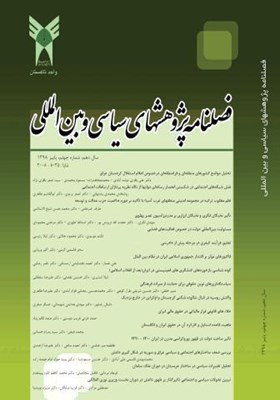خلاء های قانونی فرار مالیاتی در حقوق مالی ایران
محورهای موضوعی : مجله پژوهش های سیاسی و بین المللی
کلید واژه: مالیات, فساد مالی, حقوق مالی, فرار مالیاتی, مالیات بردرآمد, منبع (پایه) مالیاتی,
چکیده مقاله :
صمد عزتی غریب دوستی[1]- صمد قائم پناه [2] تاریخ دریافت: 12/6/1397- تاریخ پذیرش: 9/8/1397 چکیده: گسترده شدن تعهدات دولتها در جهت تحقق اهدافی چون رشد اقتصادی، ثبات قیمتها، افزایش اشتغال، توزیع عادلانه درآمد، مخارج دولت را با روندی صعودی مواجه کرده است که دولتها را بر آن میدارد تا از راههای گوناگون به تأمین مالی آن اقدام نمایند. در نتیجه میتوان مالیات را به عنوان یکی از مهمترین منابع درآمد دولتها شناخت که همیشه مورد توجه دولتها بوده است. با توجه به نقش تعیینکننده مؤدیان در فرآیند مالیات، نارضایتی و بیاعتمادی آنها، عواقبی چون بیمیلی مؤدیان به پرداخت مالیات، فرار از پرداخت مالیات و در نتیجه کاهش این منبع درآمدی دولت را در سالهای اخیر در پی داشت. از این رو قانونگذار بر آن شد که به اصلاح قوانین مالیاتی بپردازد که همین امر نیز باعث شد قوانین مالیاتی چندین بار مورد تغییر و اصلاح قانونگذار واقع گردد. در پژوهش حاضر به بررسی اصولی که قانونگذار در هنگام وضع قانون مالیاتهای مستقیم تقریباً آن را نادیده گرفته است می پردازیم. روش تحقیق، توصیفی- تحلیلی می باشد که در این روش محقق علاوه بر تصویرسازی آنچه هست به تشریح و تبیین دلایل چگونه بودن و چرایی وضعیت مسئله و ابعاد آن می پردازد و سپس جزئیات مربوط به مسئله تحقیق خود را با گزاره های کلی مربوطه ارتباط می دهد و به نتیجه گیری می پردازد. قوانین مالیاتی به طور کلی با چالش های متعددی از جمله ابهام و نارسایی، فقدان شفافیت، عدم ثبات به لحاظ تغییرات مکرر و زود هنگام قانونی مواجه بوده اند. افزایش این گونه منابع به دلایلی چون عدم انتشار، عدم امکان دسترسی عمومی به آنها و اراده سازمانی خود سبب پیچیدگی نظام مالیاتی و عدم امکان ارتباط مناسب مؤدیان و شهروندان با آن می گردد. [1]- دانش آموخته کارشناسی ارشد، حقوق عمومی، واحد صفا دشت، دانشگاه آزاد اسلامی، تهران،ایران ezzati11846samad @gmail.com [2]- استادیار و عضو هیئت علمی، گروه علوم سیاسی، دانشکده حقوق و علوم سیاسی، واحد تاکستان ، دانشگاه آزاد اسلامی، قزوین، ایران: نویسنده مسئول sghaempanah89@gmail.com
Samad Ezati Gharib Dosti[1] Dr. Samad Ghaem Panah[2] Abstract Extending government commitments to meet goals such as economic growth, price stability, employment growth, fair distribution of income, has faced a rising government spending, which has led governments to finance it in various ways. As a result, taxes can be recognized as one of the most important sources of government revenue that has always been a concern of governments. Regarding the decisive role of the taxpayers in their tax process, their dissatisfaction and distrust, the consequences of a taxpayers’ reluctance to pay taxes, tax evasion and, as a result, a decline in this government revenue source have resulted in recent years. Hence, the legislator decided to amend the tax laws, which also led to the change of the tax laws several times and the legislator was reformed. The present paper examines the principles that the legislator has almost ignored when it comes to direct taxes The research method is descriptive-analytic. In this method, the researcher, in addition to illustrating what is described, describes the reasons for how and why the problem situation and its dimensions, and then relates the details of his research problem with the relevant general propositions and concludes. Tax laws generally face a number of challenges, including ambiguity and lack of transparency, lack of transparency, and instability due to frequent and early legal changes. The increase of such resources for reasons such as non-publication, the impossibility of public access to them and their organizational will lead to the complexity of the tax system and the impossibility of proper communication between the couriers and the citizens. [1]. M.A. in Public Law, Safa Dasht Branch, Islamic Azad University, Tehran, Iran. [2]. Assistant Professor, Department of Political Science, Faculty of Law and Political Science, Takestan Branch, Islamic Azad University, Qazvin, Iran: Corresponding Author
_||_

